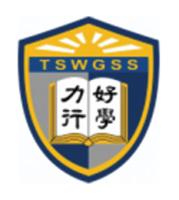| Language Policy |
- Language-across-the-Curriculum (LAC) Approach from S1 to S3: Maths, Geography, History, Integrated Science, Physics, Chemistry and Biology.<br>- To adopt Chinese or English as MOI for Senior form students according to students' language proficiency. |
| Learning and Teaching Strategies |
- The school emphasizes all-rounded development in five different dimensions, namely moral, intellectual, physical, social, as well as bi-literacy and tri-lingualism, to foster students' abilities in writing, reading, listening, speaking, and critical thinking, etc.<br>- School-based Curriculum and various learning activities are designed for the cultivation of multiple intelligences of students.<br>- To enrich English Learning Environment, monthly English Speaking Events organised (S.1–S.6). For example, Mid-Autumn Festival; Halloween, Inspirational people, Christmas, Valentines Event, Easter Egg Hunt, Superheroes, and World Cultures. Moreover, Inter-class Competitions, Inter-house Drama competition, Story Telling, Drama Appreciation, Motto Writing and Quiz are also organised. <br>- Project Learning, Self-regulated Learning, Subject-based Self-regulated Reading Scheme, 'Language Across the Curriculum' are implemented.<br>- Pre-lesson Assignments and Graded Exercises are designed to cater for learners' diversity.<br>- Free English Tutorial and Life Planning Mentorship Programme for S.3 - S.5 Underprivileged Students and Free Online English Speaking Programme for S.3 - S.6 Students are organized by Wah Yan College Alumni.<br>- 5-day Academic Festival aims to strengthen Cross-curricular Extended Learning outside the classroom and develop students' Generic Skills. |
| School-based curriculum |
1. Electives: 2X and 3X. Senior form S.4 students can choose 3 elective subjects out of 11 subjects.<br><br> 2. Curriculum highlights: <br>(1) The school promotes Self-regulated Learning and caters for the diverse needs, interests and abilities of learners by implementing policies including pre-lesson assignments, academic reflections, graded exercises, self-regulated Learning, e-learning and challenging questions. <br>(2) Life Education lessons are designed to develop students’ generic skills and help them build a positive and optimistic attitude in life. |
| Approach to Catering for Learner Diversity |
1. Small group teaching is implemented in Chinese and English classes according to students' learning abilities and by which to cater for learners' diversities. <br>2. Two class teachers in Junior form to take good care of every student. <br>3. Counseling Prefects Scheme aims to handle students with emotional needs. <br>4. Academic Prefects and English Ambassadors Scheme aim to build a learning and mentoring atmosphere among peers. Senior form students help junior form students solve difficulties in learning.<br>5. "STAR Programme" (S.1-S.3) aims to strengthen students' knowledge transfer in Chinese, English and Mathematics. It also cultivates habits of self-learning, lesson preparation and handing in cross-curricular homework.<br>6. Cross-curricular Graded e-learning lesson aims to provide students English Self-learning exercises and platform. |
| Approach to Integrated Education |
The school aims to cultivate an inclusive school culture that promotes greater understanding and acceptance of students with special educational needs (SEN) among school personnel, students, and parents. |
| Education Support for Non-Chinese Speaking (NCS) Students |
|
| Home-School Co-operation |
The school maintains communication with parents through various channels, including Parents' Day, School Newsletters, and PTA meetings. Furthermore, the PTA has established a Parent Volunteer Group to support extracurricular activities. |
| School Ethos |
Under simple school ethos, a harmonious campus is created by the concerted efforts of teachers and students. The Academic Prefects, Counselling Prefects and Mentorship Scheme help to build up a caring culture in school effectively. Leadership training programme, Volunteer Scheme and a wide variety of Other Learning Experiences (OLE) classes promote students' whole-person development. |
| School Development Plan |
The Areas of Concern for 2022/23 are: <br>1. Enhancement of students’ multiple generic skills.<br>To enhance students' multiple generic skills through cross-disciplinary and Cross-committee in Project-based Collaboration, Academic Festival and After School Extensive Learning Training.<br>2. Enhancement of students’ Self-management Capability<br>To enhance students’ self-management capability through goal-setting, interpersonal skills, career and life planning of students, leadership training and campus optimization campaign. |
| Teacher Professional Training and Development |
Besides school-based Staff Development Day and joint-school Staff Development Day, teachers are encouraged to participate in training courses, workshops and seminars so as to advance the efficacy in teaching and pastoral care. |
| Life-wide Learning |
A total of 31 clubs and interest groups allow students to achieve both physical and mental well-being in various fields like subjects, social services, sports and recreation. |
